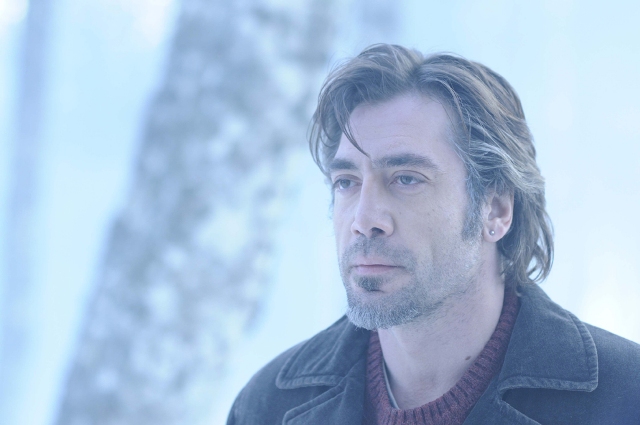CHICAGO – In anticipation of the scariest week of the year, HollywoodChicago.com launches its 2024 Movie Gifts series, which will suggest DVDs and collections for holiday giving.
Blu-Ray Review: Alejandro González Iñárritu’s ‘Biutiful’ Numbs the Senses
CHICAGO – The feel bad movie of 2010 has finally arrived in stores. Pardon me for withholding my enthusiasm. Although Alejandro González Iñárritu’s fourth feature has its share of indelible images, its familiar themes and unrelenting solemnity causes the senses to become numbed rather than engaged. The film offers 147 minutes of pure bleakness with a couple booger jokes thrown in for last-minute levity.
Only the shattering performances from Javier Bardem and Maricel Álvarez make “Biutiful” function as something more than a gorgeously lensed dirge. This is the first Iñárritu film I’ve seen that feels too long. Without the Rubix cube-like structure of his previous features, this linear descent into despair feels naggingly one note, perhaps illustrating that Iñárritu’s fractured editing was primarily what kept his viewers’ attention rapt during cumbersome dramas such as “21 Grams” and “Babel.”
 Blu-Ray Rating: 3.0/5.0 |
Bardem won the Best Actor award at Cannes and scored a surprise Oscar nomination for his wrenching work as Uxbal, a single father and well-intentioned criminal struggling to survive on the unforgiving streets of Barcelona. He houses undocumented workers at a Chinese sweatshop where he functions as a middleman. His fragile ex-wife, Marambra (Maricel Álvarez) is battling severe bipolar disorder while attempting to re-enter the lives of her children, whom she nurtures and abuses in equal measure. On top of all this, Uxbal has just received news that cancer will kill him off in a couple months. This only increases his need to seek redemption from those he has wronged. Oh, and did I mention the guy can communicate with the dead?
Despite the fact that “Biutiful” is, in essence, a singular character study, Iñárritu stuffs the film with an excess of half-formed concepts and hot-button issues. What’s worse is that his use of symbolism is more heavy-handed than ever. Images of death and decay pop up in every corner of the screen, while recurring visual motifs announce their presence with little sense of subtlety. Ever since the ticking clock on his life span is established, Uxbal repeatedly regards his reflection in bus windows, bathroom mirrors and hospital tiles, as if he’s gazing at the soul trapped within his failing body. It’s one of the few stylistic ideas that does pay off in a satisfying way by the end.

Javier Bardem stars in Alejandro González Iñárritu’s Biutiful.
Photo credit: Lionsgate Home Entertainment
The most powerful sequences in the film center on Uxbal’s family life, and his efforts to protect his children from Marambra’s pervasive illness. Of course, the overwhelming stress causes Uxbal to lose his temper at the dinner table, which shudders with his volatile mood swings. Bardem’s wounded vulnerability reins in the audience’s empathy, despite his character’s multiple flaws. One particularly devastating scene (routinely shown on the awards circuit) involves Uxbal’s daughter Ana (a remarkable Hanaa Bouchaib), and her pursuit to learn the truth about her father’s health. Unfortunately, Iñárritu’s attention span remains restless, resulting in a multi-layered mess that crams in too many subplots which hobble the dramatic momentum. Thus, the film works only in fits and starts. Uxbal’s unsettling encounters with disgruntled ghosts are intensely eerie and suggest that Iñárritu could be capable of making a mightily effective horror film. Yet these odd doses of surrealism inspire unwelcome comparisons to Apichatpong Weerasethakul’s infinitely superior, “Uncle Boonmee Who Can Recall His Past Lives,” which takes a more visionary and richly textured approach to a similar premise.
 Biutiful was released on Blu-Ray and DVD on May 31, 2011. Photo credit: Lionsgate Home Entertainment |
“Biutiful” is presented in 1080p High Definition (with a 2.35:1 aspect ratio), and includes a 21-minute featurette where Iñárritu reveals some behind-the-scenes stories that are often more interesting than the film itself. Senegalese street vendor Ekweme was portrayed by Cheikh Ndiaye, who had a history of running from the police while living as a squatter. Ekweme’s wife Ige was played by Diaryatou Daff, who was notified mid-production that she was to be deported. There’s a brief but memorable clip in which Iñárritu is seen consoling Daff with the promise that her “work will open doors.” Thankfully, Daff is later seen obtaining her Visa, and is welcomed back to the set with enthusiastic applause. This moment provoked a more emotional response in me than anything in the actual movie.
Iñárritu also discusses how he went about building chemistry and family dynamics between his actors, and how he managed to coax reluctant extras into playing corpses. Long rehearsal days were utilized in order to ensure that the extras appeared believable in their lifelessness. Seven cameras and hundreds of set-ups were needed to document a chaotic chase between the vendors and cops in the crowded plaza. The director compares some of the most intimate days of shooting to “microsurgery,” while claiming that it was his intention to make Uxbal’s hallucinogenic journey through a bar resemble a “trip into Dante’s Inferno.”
Rounding out the extras are a 4-minute music video featuring faces of the crew, and 8 minutes of all-too-brief interviews with Bardem, Álvarez and acclaimed Barcelona actor Eduard Fernández, who plays Uxbal’s brother. Álvarez is practically unrecognizable in her strength, while Bardem appears exhausted and somewhat baffled by the experience. While he’s sure that he learned something from it all, he still isn’t sure what that lesson is. I feel your pain, Javier.
 | By MATT FAGERHOLM |


